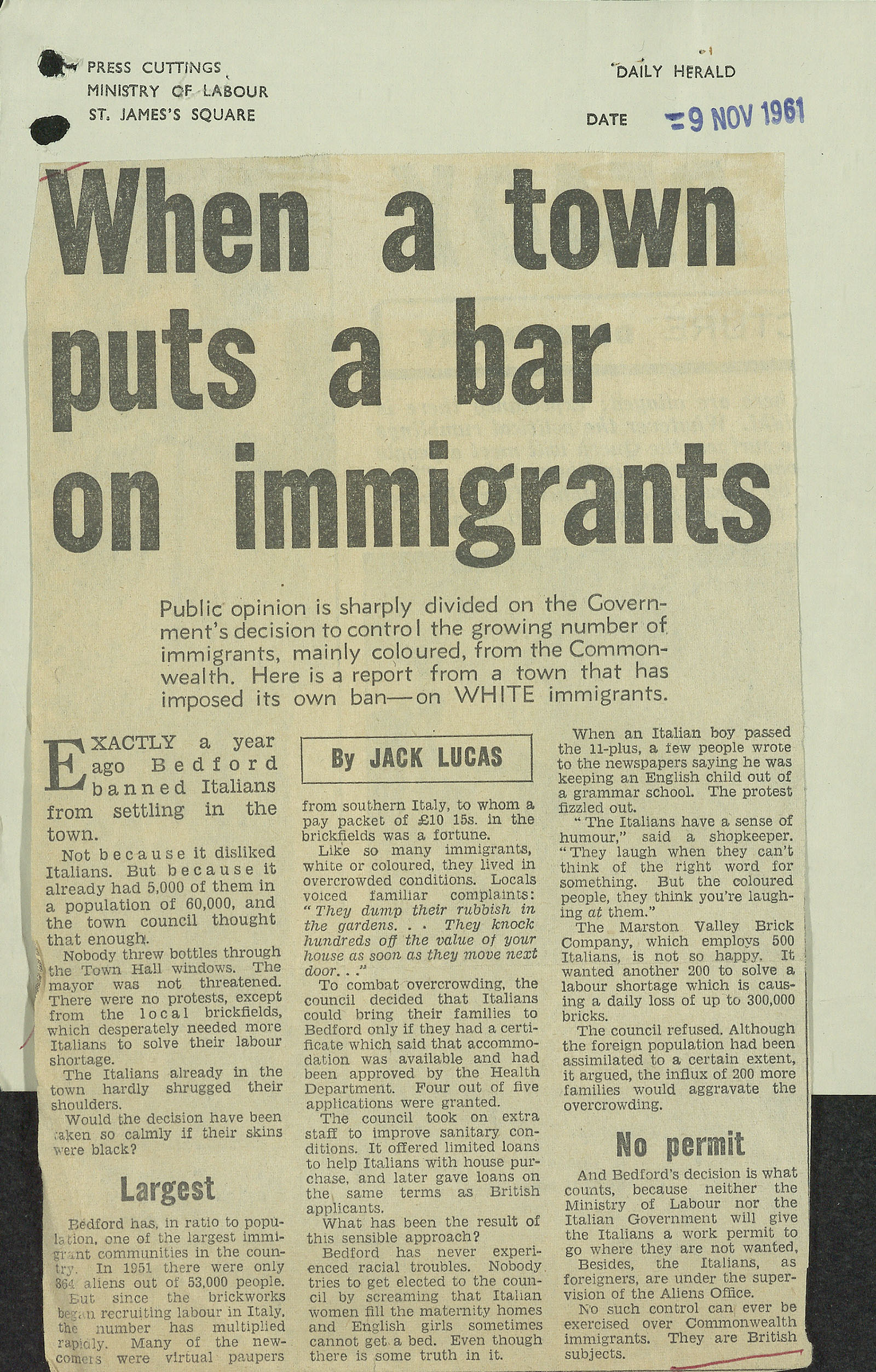
An article from the Daily Herald, 9 November 1961. Catalogue ref: LAB 8/2201
Although immigration had been encouraged because of the post-war labour shortage, many of those who arrived in Britain during the 1950s and 1960s encountered resentment from local people in the areas where they lived and worked. This article gives a glimpse of the controversy regarding Italian workers that erupted in Bedford in 1961.
Contains original language used at the time, which is not appropriate today.
- Why do you think this newspaper was saved in a Ministry of Labour file?
- Why were 200 Italians banned from living and working in Bedford?
- What is the difference in the attitude of the writer towards immigrants from Italy and those from the Commonwealth?
Transcript
When a town puts a bar on immigrants
BY JACK LUCAS
Public opinion is sharply divided on the Government’s decision to control the growing number of immigrants, mainly coloured, from the Commonwealth. Here is a report from a town that has imposed its own ban- on WHITE immigrants.
EXACTLY a year ago Bedford banned Italians from settling in the town. Not because it disliked Italians. But because it has already had 5,000 of them in a population of 60,000 and the town council thought that enough.
Nobody threw bottles through the Town Hall windows. The mayor was not threatened. There were no protests, except from local brickfields which desperately needed more Italians to solve their labour shortage. The Italians already in the town hardly shrugged their shoulders. Would the decision have been taken so calmly if their skins were black?
Largest
Bedford has, in ration to population, one of the largest immigrant communities in the country. In 1951 there were only864 aliens out of 53,000 people. But since the brickworks began recruiting labour in Italy, the number has multiplied rapidly. Many of the newcomers were virtual paupers from Southern Italy, to whom a pay packey of £10 15shillings in the brickfields was a fortune.
Like so many immigrants, white or coloured, they lived in overcrowded conditions. Locals voiced similar complaints: “They dump their rubbish in the gardens… They knock hundreds off the value of your house as soon as they move next door…”
To combat overcrowding, the council decided that Italians could bring their families to Bedford only if they had a certificate which said accommodation was available and had been approved by the Health Department. Four out five applications were granted. The council took on extra staff to improve sanitary conditions. It offered limited loans to help Italians with house purchase, and later gave loans on the same terms as British applicants. What has been the result of this sensible approach?
Bedford has never experienced racial troubles. Nobody tries to get elected to the council by screaming that Italian women fill the maternity homes and English girls sometimes cannot get a bed. Even though there is some truth in it.
When an Italian boy passed the 11+, a few people wrote to the newspapers saying he was keeping an English child out of a grammar school. The protest fizzled out.
“The Italians have a sense of humour,” said a shopkeeper. “They laugh when they can’t think of the right word for something. But the coloured people they think you’re laughing at them”.
The Marston Valley Brick Company, which employs 500 Italians is not so happy. It wanted another 200 to solve a labour shortage which is causing a daily loss of up to 300,000 bricks.
The council refused. Although the foreign population had been assimilated to a certain extent, it argued, the influx of 200 more families would aggravate the overcrowding.
No permit
And Bedford’s decision is what counts, because neither the Ministry of Labour no the Italian Government will give the Italians a work permit to go where they are not wanted.
Besides, the Italians, as foreigners, are under the supervision of the Aliens Office.
No such control can ever be exercised over Commonwealth immigrants. They are British subjects.
